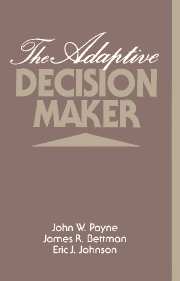Book contents
- Frontmatter
- Contents
- Preface
- 1 Adaptive decision behavior: An introduction
- 2 Contingencies in decision making
- 3 Deciding how to decide: An effort–accuracy framework
- 4 Studying contingent decisions: An integrated methodology
- 5 Constructive processes in decision making
- 6 When may adaptivity fail?
- 7 Improving decisions and other practical matters
- 8 The adaptive decision maker: A look backward and a look forward
- Appendix: The Mouselab system
- References
- Name index
- Subject index
6 - When may adaptivity fail?
Published online by Cambridge University Press: 05 June 2012
- Frontmatter
- Contents
- Preface
- 1 Adaptive decision behavior: An introduction
- 2 Contingencies in decision making
- 3 Deciding how to decide: An effort–accuracy framework
- 4 Studying contingent decisions: An integrated methodology
- 5 Constructive processes in decision making
- 6 When may adaptivity fail?
- 7 Improving decisions and other practical matters
- 8 The adaptive decision maker: A look backward and a look forward
- Appendix: The Mouselab system
- References
- Name index
- Subject index
Summary
Introduction
Throughout this book, we have emphasized how adaptive individuals are in their decision making. Whether by means of top-down usage of existing strategies or by constructing strategies on the fly, we have characterized decision makers as making tradeoffs of accuracy and effort that generally are reasonable and appropriate for the task at hand. However, individuals may not always exhibit such adaptivity. Even if individuals are trying to adapt, they may not be able to under some circumstances.
There are two major classes of factors associated with potential failures in adaptivity. Being adaptive requires both various types of knowledge and the ability to execute strategies. Deficits in either of these two categories can lead to the failure of adaptivity. Deficits in types of knowledge can include difficulties in assessing the task and context factors characterizing the decision environment, lack of knowledge of appropriate strategies, not being able to assess the effort and/or accuracy of a strategy in a particular situation, and not knowing one's desired accuracy–effort tradeoffs.
Even if these aspects of knowledge are present, an individual may still fail to adapt because he or she cannot execute the appropriate strategy. Such inability to execute a strategy may often be due to various environmental stressors or memory and computational difficulties.
In the following sections we consider both deficits in knowledge and inability to execute strategies as reasons for failing to adapt.
- Type
- Chapter
- Information
- The Adaptive Decision Maker , pp. 192 - 217Publisher: Cambridge University PressPrint publication year: 1993



